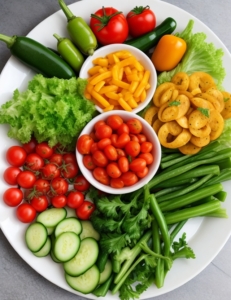Home Grown Vegetables vs. Store-Bought: Which is the Better Choice?
The choice between home grown vegetables vs. store-bought produce is a perennial dilemma for many consumers. Each option comes with its own set of advantages and considerations. In this post, we’ll explore the pros and cons of both homegrown and store-bought vegetables, helping you make informed decisions about your dietary choices and food sources.
Home Grown Vegetables:
Pros:
- Freshness and Flavor: Homegrown vegetables are renowned for their unparalleled freshness and flavor. Picked at their peak ripeness, they often boast superior taste and texture compared to store-bought counterparts.
- Control Over Growing Conditions: When you grow your own vegetables, you have full control over the growing conditions. You can choose organic practices, control pesticide use, and customize the soil to optimize nutrient content.
- Variety Selection: Home gardeners have the freedom to select from a wide variety of vegetable cultivars, including heirloom and rare varieties that may not be readily available in stores.
- Reduced Environmental Impact: Growing your own vegetables can lead to a reduced environmental footprint. You can employ sustainable practices such as composting, reduced water usage, and minimal transportation.
- Emotional Satisfaction: There’s a sense of accomplishment and satisfaction in cultivating your own food. Gardening can be a therapeutic and rewarding hobby that connects you to the natural world.
Cons:
- Time and Effort: Home gardening requires an investment of time, effort, and patience. You’ll need to prepare soil, sow seeds, nurture plants, and address potential issues like pests and diseases.
- Space Constraints: Not everyone has the space or suitable outdoor conditions for a garden. Apartment dwellers and those with limited yard space may find it challenging to grow vegetables at home.
- Seasonal Limitations: Homegrown vegetables are subject to seasonal availability. You may have an abundance during the growing season but limited options in the off-season.
Store-Bought Vegetables:
Pros:
- Convenience: Store-bought vegetables offer unmatched convenience. They are readily available year-round, saving you the time and effort required for home gardening.
- Diverse Selection: Grocery stores typically carry a wide range of vegetable varieties, making it easy to experiment with different cuisines and dishes.
- Consistency: Store-bought vegetables are produced on a large scale and adhere to certain quality standards, ensuring consistency in appearance and taste.
- Global Accessibility: You can access vegetables from around the world at your local grocery store, broadening your culinary horizons.
Cons:
- Reduced Freshness: Store-bought vegetables are often harvested before they reach peak ripeness to withstand transportation and storage. This can result in reduced flavor and nutritional value.
- Pesticide Residues: Conventional store-bought vegetables may contain pesticide residues. While many are within safe limits, some consumers prefer to minimize their exposure.
- Environmental Concerns: The production and transportation of store-bought vegetables can contribute to greenhouse gas emissions and environmental degradation.
The choice between homegrown and store-bought vegetables ultimately depends on your preferences, resources, and lifestyle. Homegrown vegetables offer unparalleled freshness and flavor, control over growing conditions, and sustainability benefits. However, they require time, effort, and space.
Store-bought vegetables provide convenience, diverse selection, and year-round availability, but they may sacrifice freshness and have environmental considerations.
Some consumers choose to strike a balance by growing select vegetables at home while complementing their diet with store-bought options. Whichever path you choose, remember that both homegrown and store-bought vegetables can play a valuable role in a balanced and nutritious diet.



